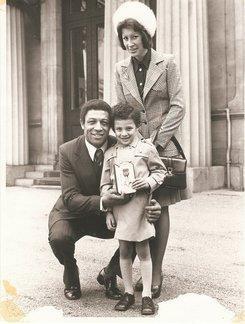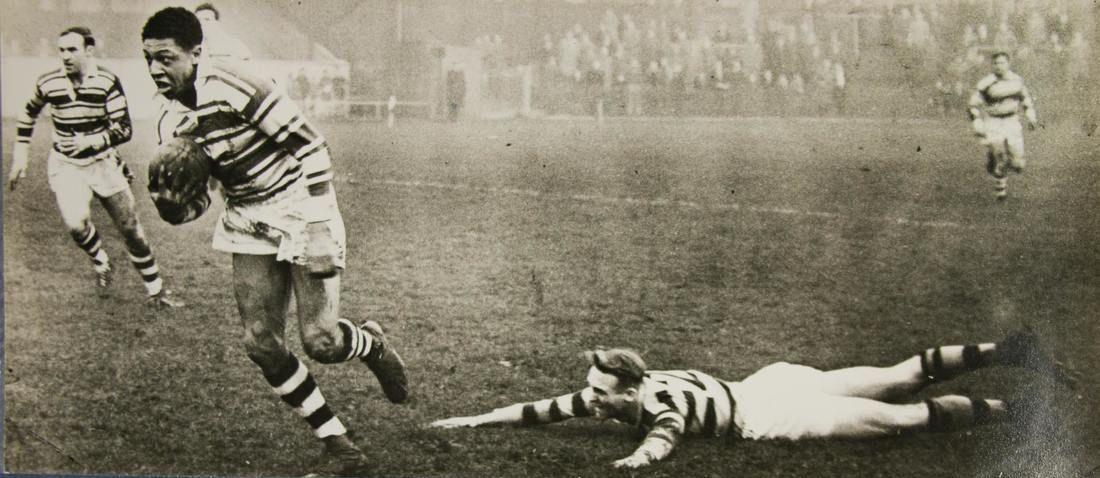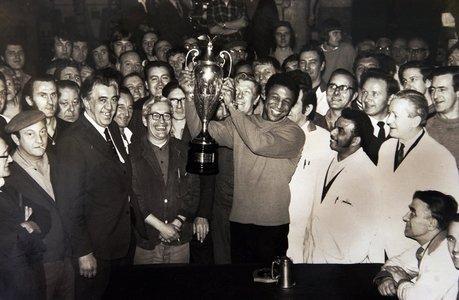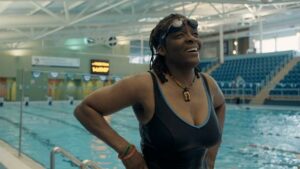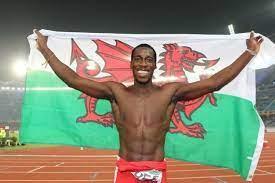Clive A Sullivan MBE
Clive Sullivan MBE was a Welsh Rugby Union and professional Rugby League World Cup winning footballer from the 1960s to the 1980s. He played winger for Great Britain, Wales, Hull FC and Hull Kingston Rovers in his career. Sullivan still holds two records for Hull; the most tries in a career( 250), and most tries in a match. He is also one of fewer than 25 Welshmen to have scored more than 1,000 points in their Rugby League career. Most notably, he was the first Black person to captain a national team in major sports in the United Kingdom.
1943
8/10/1985
Wales
Mother was of Antiguan descent, father was Jamaican
1967 -Scored 28 tries in 28 matches and made his international debut for Great Britain, scoring two tries against France
1972- Selected as Captain for Great Britain’s tour, which made him the first Black person to captain any national team in major sports
1974- Awarded an MBE in the 1974 New Year Honours list for services to Rugby League.
1975- Captained Wales to finish third in the Rugby League World Cup
2001- The Clive Sullivan Memorial Trophy was awarded to the winner of the Rugby League local derby match between Hull and Hull Kingston Rovers and has continued since
2020- Named to be honoured with a new statue in Cardiff Bay
2021- Honoured with a Google Doodle, celebrating what would have been his 78th birthday.
Clive Sullivan was born into the only Black family in Splott. His mother was of Antiguan descent and his father of Jamaican descent. Sullivan had always loved playing rugby, however, from the age of fourteen he had several injuries which required operations and doctors doubted whether Clive would ever be able to walk normally again let alone pursue his rugby career.
Outside of his rugby career:
Clive worked as a motor mechanic for a while after leaving school.In 1961 he joined the British Army and completed his basic training at Catterick in North Yorkshire. He then went on to be trained as a radio operator, once qualified he volunteered as a paratrooper. Sullivan joined 216 Parachute Signals Squadron at Farnborough. In January 1964 he saw active service with his unit in Nicosia and was subsequently attached to the United Nations Peacekeeping Force. Sullivan was awarded the United National Medal for his service
.
Rugby Career:
Whilst Sullivan didn’t find success during a trial for Bradford Northern Rugby League, the touch judge approached him, offering a trial at Hull FC. This trial game was a great success for Sullivan where he was dubbed Mr X by local press after scoring three tries and he was signed as a professional player the next day. However, his career did not start smoothly . It was restricted by army duties, continual knee injuries and a near-fatal car crash. Despite this, Hull continued to see his potential and Sullivan returned back to the game promptly, playing the last game of the season.
1967
Sullivan scored 28 tries in 28 matches and made his international debut for Great Britain scoring two tries against France.
During Great Britain’s tour to Australia and New Zealand, he was frustratingly held back by his injuries again.
1972 World Cup:
This saw Sullivan’s rugby career gain great success. He was selected as Great Britain’s captain and was the first Black player to lead a British national team in major sports. Great Britain won the World Cup in France that year under Sullivan’s captainship.
One of Sullivan’s tries in the final against Australia is often regarded as the most famous try in the history of the World Cup.
Overall, Sullivan represented Great Britain seventeen times, appearing at three World Cups.
1975 Rugby League World Cup:
Sullivan also captained Wales to finish third in the 1975 Rugby League World Cup.
Hull Clubs:
1973-4 Sullivan played for Hull FC before switching to a rival team, Hull Kingston Rovers. Sullivan was the only player to score 100 tries for both Hull clubs. Unexpectedly, at the age of39 he returned back to Hull FC in 1982 and played there until his retirement three years later.
Over his career there he scored 250 tries in his 352 games for Hull FC and 118 tries in his 213 games for Hull Kingston Rovers. His performances for both Hull teams have often qualified him as a sporting legend which was remembered in the This is Your Life television programme and in Wilberforce House Museum where Sullivan’s ‘red book’ is on display.
Since 2001 the Clive Sullivan Memorial Trophy has been awarded to the winner of the Rugby League local derby match between Hull and Hull Kingston Rovers.
2020 December, Sullivan was named to be honoured with a new statue in Cardiff Bay.
2021 April, Sullivan was honoured with a Google Doodle, celebrating what would have been his 78th birthday. He still holds two records for Hull the most tries in a career, 250, and most tries in a match
Sullivan is one of few than 25 Welshmen to have scored more than 1,000 point in their Rugby League career.
Sullivan met Rosalyn Daniel when they were both seventeen in a local Hull gig. Rosalyn was a white woman and has described the difficulties they had living in a small village and having an inter-racial relationship at this time. They married on a match day and Rosalyn recalls feeling special that Sullivan would give up a game of rugby to marry her. They had a daughter Lisa and a son Anthony who went on to play professional rugby for both Wales and Great Britain. There is a detailed, personal account from Rosalyn about their life together recorded and presented on African Stories in Hull and East Yorkshire which will be cited below.
Robert Gate, Gone North (London: R.E. Gate, 1986)
Rebecca Nelson, ‘Clive Sullivan: Britain’s First Black Rugby Captain’, African Stories in Hull & East Yorkshire (African Stories in Hull & East Yorkshire, revised 2021) <https://www.africansinyorkshireproject.com/clive-sullivan.html> [10 February 2022]
BiM, ‘Clive Sullivan- Rugby’s First Black Captain’, Sporting Heroes (BiM, revised 7 December 2021) <https://www.blackhistorymonth.org.uk/article/section/sporting-heroes/clive-sullivan-rugbys-first-black-captain/> [11 February 2022]
Ben Carrington, Ian McDonald, ‘Race’, Sport, and British Society (Oxfordshire: Routledge, 2001)
Peter Jackson, Triumph and Tragedy: Welsh Sporting Legends (Edinburgh & London: Mainstream Publishing, 2012).
